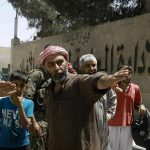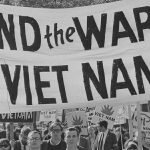By Nurcan Baysal
It is the first days of the new year. Early in the morning, I leave my home in Diyarbakır, the de facto Kurdish capital of southeast Turkey, and head to Cizre, a district in along the border with Syria. We make our way through the fog. The checkpoints begin halfway into our journey, around Nusaybin. Turkish flags have been painted on to concrete barriers at the checkpoints.
I avoid looking to my right as much as possible to avoid seeing the tall wall that was built on the border with Rojava, the Kurdish name for northern Syria. Passing the controls at the entrance to Cizre, I enter town under a steady downpour.
Cizre has a chaotic appearance, lively yet desolate. I make my way to the pro-Kurdish Peoples’ Democratic Party (HDP) building. There is talk of last week’s primary elections, in which voters selected the mayoral candidates who will run in the local elections to be held in the next few months.
I learn that on the day of the primary, the building was packed and participation was high. There were a total of 14 primary candidates, nine men and five women. 430 votes were cast. The co-mayors of Cizre will be selected from among the top three men and women candidates.
Over the past few years, the central government has appointed administrators to run municipal governments in order to root out Kurdish opposition in the region. Before their appointment, Cizre’s municipal government had 40 million Turkish liras ($7.5 million). Now, the municipal government is 280 million liras ($52 million) in debt.
“It will be very difficult for the elected mayor to deal with these debts,” someone tells me. Someone else says, “That’s fine. We should exert our will and elect someone, and worry about the rest later.” They say that 150 government trustees were brought from central Anatolian cities such as Malatya, Yozgat, Kayseri, and Maraş, and appointed to the municipalities.
There is an endless flow in and out of the building. “How many votes will the HDP get in the elections?” I ask. The consensus is that the HDP will win at least 80 percent of the vote. One of the people in the room comments, “The government plays plenty of games, but Cizre will never bow down.”
We talk about the Housing and Development Administration (TOKI) buildings that were constructed to replace the buildings demolished during curfews imposed by the government in 2015. The keys to 100 houses have been distributed recently, but these families still have not received payment plans. The cost of one apartment begins at 170,000 liras ($32,000).
There are ditches all over Cizre. The roads are full of potholes. We are unable to access many of the streets by car because of how big the ditches are. I ask my Cizre guide, “Why doesn’t the trusteeship fix these potholes?” My guide responds, “They fill it with the cheapest asphalt, and within a month the asphalt caves.”
The other trusteeships in the region have been embarking on some projects, even if just for show, such as planting flowers and installing decorative lighting along roads and medians.
This surprises me about Cizre. It seems that the government does not even feel the need to work on projects for show. The streets of Cizre are in ruins.
The old cobblestone streets are gone. My guide tells me, “The provincial governorship has banned the use of cobblestones because it is easier to install mines under them.”
As I trudge through the streets in the rain I come across graffiti on the wall. It says, “The end of the road is full of holes.” I smile.
The Cizre native next to me tells me, “Ms. Nurcan, there used to be an ad slogan that went, ‘You can see for yourself, you don’t need us to tell you.’ That’s how Cizre is, every part of it is in ruins, you can see the state of the streets for yourself, you don’t need us to tell you.”
The streets of Cizre are not the only structure in ruins. The inside and outside of buildings, everywhere is in tatters, and carries the marks of three years prior, during intense fighting between government forces and Kurdish opposition. Bullet holes are everywhere. In one of the houses I visit, a rocket shot into the house three years ago left a gaping hole in the living room wall.
The Mem û Zin Cultural Center, which is still used as a police station, overlooks all of Cizre from a hill. Just like in Diyarbakır, in Cizre there are Turkish flags and pictures of President Recep Tayyip Erdoğan hanging on the street every few meters.
Unlike Diyarbakır, Cizre is full of tanks, riot control vehicles, and armoured cars. We pass in front of Fatih High School. After being turned into a police station during the curfews, the school is still used as a police station today. There is talk of the increase in drug use over the past two years. In fact, a young person died of an overdose a few months ago.
I see many people returning from the graveyard. Many families spend Friday nights at the cemetery. There seem to be no families who have not lost someone in the war. I visit a handful of families over the course of the day.
Children are emotionally scarred. In one of the homes I visit, a seven-year-old who lost a father during the curfews asks, “Mom was there a war here?”
A child in another home expresses “not wanting to attend schools run by this state.” In another house, a woman tells me about her son who is still missing. I learn that the bodies of 15 young people who died during the curfews have yet to be found.
A father who lost his son says, “Some people talk of hell, but I have seen it with my own eyes.” A mother tells me how she was unable to save her child from 50 metres away.
Despite all of these hardships, the people of Cizre are resilient. I am in awe of Cizre once more. When I ask a woman who lost her two children during the curfew whether peace is possible, she responds: “You enter a cave, and you see that raindrops have hollowed out a hole. Just think, a drop of water melts away stone. I believe that those who resist will win, and that peace will come.”
Source: Ahwal News



